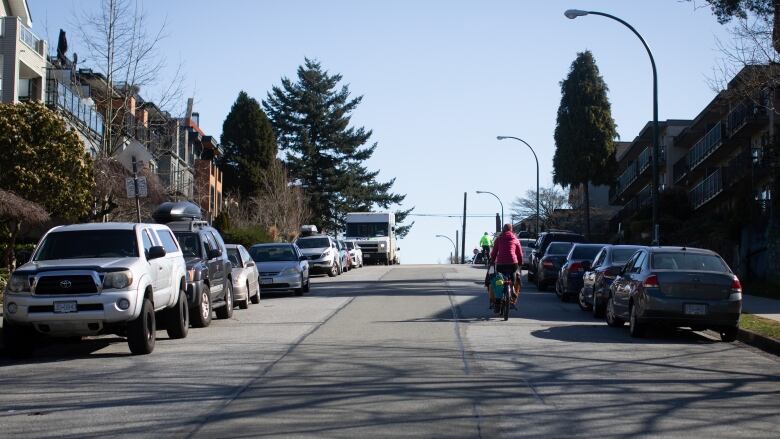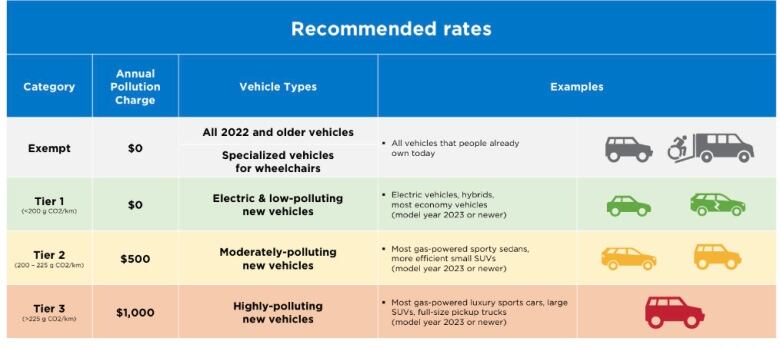Vancouver city council scraps controversial Climate Emergency Parking Program
Overnight parking permits and a pollution charge for gas vehicles bought after 2022 were part of plan

Vancouver city council failed to pass a new Climate Emergency Parking Program designed to raise revenue to fight climate change, with sixvotesagainst the plan and five in support of it.
Mayor Kennedy Stewart, who castthe deciding voteWednesday night,joined five councillors who were originally elected under the Non-Partisan Associationbanner in opposition.
Stewart pointed out the proposed program would disproportionately impact middle- and low-income families and asked staff to find a better way forward.
"It would have asked those renting basement suites or working in vehicle-dependent jobs to pay more while asking homeowners with private parking to pay nothing. And these inequitable outcomes would become entrenched," said Stewart in a statement.
The Climate Emergency Action Plan hastwo separate but linked aspects: one would have madeall streets in the city subject to overnight permit parking fees that would havecost $45 annually, or$5 for low-income residents, and a $3 nightly fee for visitors who live outside the city.
The other would haveincreased the price of street parking permits for high-emission vehicles to $500 or $1,000 year, but only on new vehicles with a make of 2023 or later.

The proposal hadbeen in the works fornearly a year, and is related to the city'sclimate emergency goalsof promoting active transportation and zero emission vehicles.
A staff report showedthat $230 million in additional funding is needed to fully fund the Climate Emergency Action Plan and that the parking program could cover about a quarter of that amount.
City staff estimated the program would bring in between $44 million and $72 million by 2025, with the money going to projects like bus priority lanes, 100 new curb ramps at intersections, planting 1,000 trees and installing new charging stations.
The city's goal is to reduce carbon emissions by 50 per cent byencouraging less polluting vehicle purchases and reducing air and carbon pollution.
The city says about 10 per cent of the city's residential streets require parking permits and new overnight-only zones would havecovered remaining residential streets.
Reaction to the parking proposal
During the six hours of public comment Wednesday, many in favour argued the city needed to incentivize other forms of transportation, and said free overnight street parking was inequitable because it subsidized car users.
Green Party councillor Adriane Carr broke down in tears as she tried to persuade her fellow councillorsto vote in favour of the plan.
"It's not about choosing the best approach. It is about taking every possible action we can to reduce our greenhouse gas emissions and ensure that our children have a future. I am a grandmother, and I'm sorry if I'm emotional about this, but every day I think about their future. A nine-month-old grandson and a three-year-old grandson, they're going to be alive in [year]2100."
Carr explained thatafter attending a conference on climate change in Berlin and listening to scientists, she fears Vancouver will experience temperatures as high as 50 C by 2100 if action isn't taken to reduce greenhouse gas emissions.
However, those against the policy argued it wasn't equitable because it only affected street parking meaning the change would have primarily affected drivers without a garage or dedicated residentialparking. Others saidthat it was a tax grab, or that it was an issue that should be left to regional or provincial governments.
Under the program, there would have been exemptionstothe annual fee on existing higher-polluting vehicles with a make of 2022 or older,and vehicles for people with disabilities.
With files from Justin McElroy












_(720p).jpg)


 OFFICIAL HD MUSIC VIDEO.jpg)
.jpg)



























































































